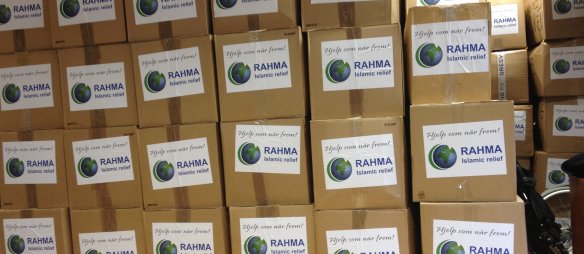While a small number of young Norwegian Muslims have travelled to Syria to join militant groups as “foreign fighters”, far greater numbers of young Muslims are supporting humanitarian efforts.
Most media attention is focused on young people travelling abroad to fight, rather than on young people’s humanitarian work. Throughout the autumn, aid organizations and groups of individuals have been collecting winter clothing, footwear, sleeping bags and blankets. With winter closing in, the situation is precarious and there is great enthusiasm for collecting clothes and blankets to send to civilians both in Syria itself and in refugee camps in the region.

Photo: Marta Bivand Erdal, PRIO
The unifying effect of Muslim identity
The Rahma Islamic Relief Fund is a humanitarian aid organization that works to help the poor and needy. Rahma mobilizes support across generations, ethnicities and mosque affiliations. Through Rahma, hundreds of young people have contributed to aid efforts by organizing voluntary fundraising events, street collections, clothing donations, charity bazaars and gala dinners to raise money for the poor and needy. In November alone, Rahma organized the collection of five-and-half tons of clothing for Syria, street collections for the Rohingya people in Myanmar, and cake sales to provide emergency aid in Syria and Gaza.
Young people from Muslim backgrounds are united by a desire to help people who are in need, suffering oppression, or victims of conflict. While members of their parents’ generation are more likely to be involved with organizations connected to mosques or their countries of origin, young people tend to channel their voluntary efforts through organizations where Muslim identity is the unifying factor, regardless of ethnic origin. The size and scope of these initiatives cannot be compared with those of the well-known Norwegian and international aid organizations. The Muslim efforts are local initiatives run by volunteers, with everything that is collected going in full to the people in need. All those involved donate their time, and unavoidable expenses, such as transport costs, are often covered by members of the organizations.
Religion motivates aid efforts
During our research into charitable activities and development efforts among Muslims in Norway, we have interviewed more than 60 people, mainly Pakistani-Norwegians in the Oslo region. Providing help to the poor and needy is central to many Muslims’ religious practice. Many young people become involved in such work through voluntary organizations linked to mosques or religious communities. For the majority of those we have spoken to, religion is an important motivating factor for getting involved, but ideas about solidarity and fairness are also very important. Muslims’ support for other Muslims is not unlike the spirit of solidarity we find in other religious or ethnic groups. Most people we have spoken to share a willingness to assist the poor and needy whoever they are and wherever they come from.
Many regions affected by natural disasters and conflicts have large Muslim populations. Norwegian Muslims’ eagerness to assist people suffering oppression and the victims of conflicts in Palestine, Syria and Myanmar, results from a feeling of solidarity with Muslims in vulnerable situations. This does not mean that Norwegian Muslims are unwilling to assist non-Muslims who are in need and suffering the effects of conflict. But Muslim organizations and networks often have different channels for obtaining information from affected regions, and different opportunities to send assistance. The oppression and massacre of the Muslim Rohingya minority in Myanmar, for example, has attracted little attention in the Norwegian media. For many Muslims, this makes it all the more important to direct attention and aid efforts towards this group.
Trust and voluntary efforts
Following the 9/11 terror attacks in the United States, Muslim aid organizations have often been accused of funding terrorists and militant groups. In recent years, they have been accused of funding fighting in Syria. Such accusations have also been directed at Muslims in Norway. In our experience, the people we have spoken to are concerned that the aid they send to Syria or other places should not end up in the wrong hands or be used for anything other than humanitarian relief efforts. Accordingly much aid is given through networks and organizations on the basis of trust. The fact that people not only give financial support, but also give up their time to run the organization, contributes to increasing the level of trust.
Also in Oslo
Now that winter has arrived in the streets of Oslo, help is not only being sent to Syria. Recently there was a cake sale and a collection to benefit the homeless and needy in Oslo. Such humanitarian efforts, which transcend ethnic and religious divides, are a boost for the whole of Norwegian society.
This text was published in Norwegian 19 December 2014 at NRK Ytring: Norske fremmedhjelpere
Translation from Norwegian: Fidotext